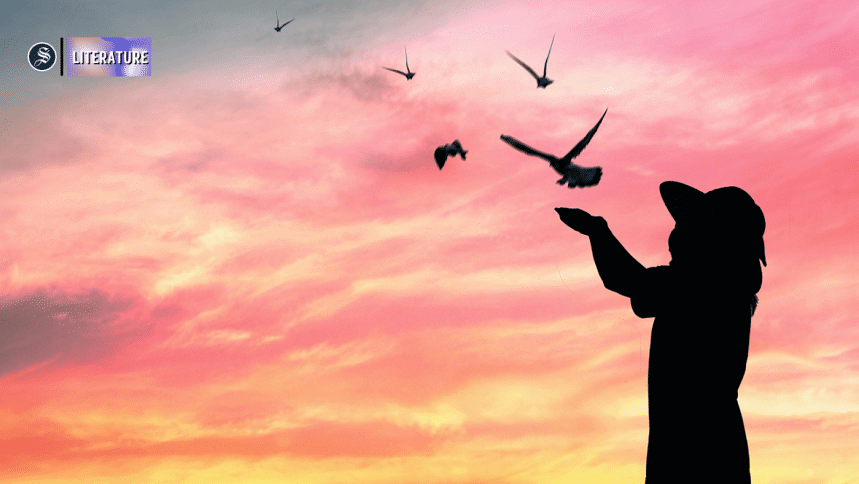Shadhin

My 10-year-old daughter Sumedha wanted to keep a mynah in her room. I was dead against it as I did not approve of the idea of keeping birds in a cage. Birds ought to have the freedom to fly in the wide blue sky, over the cityscape of Dhaka that has a few green trees peeping like bushy broccolis from between the concrete buildings. My tenacious child's demand made us buy one at last, which she named Shadhin. I don't know why she chose that name, and if she even understood the deeper meaning of the word.
A month passed by, and we noticed that the mynah did not repeat what we said. Sumedha wanted a bird that she could teach words. The second month also passed by and no sign of any human word came out of the bird's beak. Sumedha was fed up and did not want to play with it anymore. She did not give food or water to it on time as well; I took care of Shadhin's basic needs instead of Sumedha.
Both my husband and I sat with Sumedha during dinner and casually broached the idea of setting Shadin free. Sumedha was surprised first and then angry, "I bought him, fed him, gave him a home, why doesn't he listen to me? He should repeat what I say!"
My husband, her Baba, said, "Sumedha, you cannot force someone to follow you. It's his choice whether he would like to take instructions from you. He is not happy here, set him free and you will feel good as well, I tell you."
Sumedha replied with annoyance, "I will make him say the words. It's so simple, 'Apni kemon achhen, bhalo?' Why can't he say it?"
We thought of not forcing our child but giving her some time to understand by herself.
In the meantime, on July 18, 2024, the Quota Reform Movement took place, and the media was full of video footage of students being shot in the streets. My husband and I, both of us being private university teachers, were getting heart wrenching updates from our own students about being shot or arrested. Sumedha was asking questions about these incidents: "Ma, why did the police shoot the students?"
I replied, "They wanted the quota system from government jobs to be reformed. But the government was adamant and did not approve the request. It wanted the students to follow what it prescribed."
Sumedha was furious, "But Ma, that's wrong. People can request or say what they want. Why is the government forcing its views on the students?"
"That is what the addiction of political power does to people."
Curfews and internet blackouts followed in the next few days and the month of July had become the historical Red July of 2024. Sumedha was not happy at all and did not want to eat, making the excuse of having no appetite. But I could see that the killings of innocent kids on rooftops and verandas made her sad. She suddenly started to take good care of Shadhin and spoke to him when she was worried. "Tumi kemon achho? Bhalo toh? Ami bhalo nei, dekho sobai onek koshto pacche. Emon ki kokhono hoi bolo? Amra bhalo nei." The bird was still silent and looked blankly at Sumedha from the grills of his cage.
Sumedha asked us to bring a bigger cage and another female mynah as a companion to Shadhin. We thought of giving it a try and bought a female mynah which our daughter named Mugdho. We could definitely notice that she named the bird after Mugdho–the innocent student who was shot dead during the movement. Unfortunately, that bigger cage was not satisfactory to the pair of mynahs. Shadhin seemed happy to have a new friend, but after two days, he stopped eating. We tried hard to cheer him up, but it did not work. Mugdho also followed Shadhin and stopped taking regular feeds from us.
On August 5, 2024, the day of the students' victory over the Hasina regime, Sumedha opened the gate of the big silver cage, and held both Shadhin and Mugdho in her hands. "Tomra onek onek bhalo theko, chole jao tomader nijer thikanai," she said.
We were wondering what had made Sumedha take this action. Perhaps the revolt by the students had touched her soul and she realised that nothing can be achieved when we force someone to do something.
Sumedha stood on our fourth floor balcony and opened her palms, Shadhin on the right and Mugdho on the other. The afternoon sky was dark grey; clouds were full of water droplets as if they were holding in their grudge for a long time and were now ready to pour out. A silver lining on the edge of the sun in the west was shining brightly and glorified a part of the horizon. Mugdho flew away instantly, but Shadin was still there. He opened his beak and uttered, "Kemon achhen, bhalo?"–the same words that Sumedha tried to get him to say for months. Shadhin preferred not to utter them to defy Sumedha's dictatorship. He looked at Sumedha, fluttered his wings, and flew towards the silver lining.
Dr. Sabreena Ahmed is Associate Professor at the Department of English and Humanities, School of Humanities and Social Sciences, BRAC University.

 For all latest news, follow The Daily Star's Google News channel.
For all latest news, follow The Daily Star's Google News channel. 










Comments